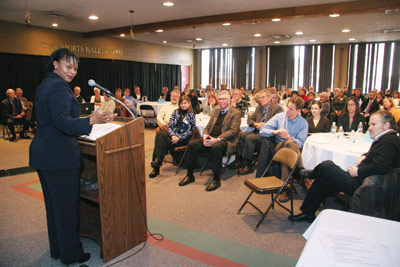The upcoming year will call for tough political choices, Mayor Terry Bellamy told a roomful of people at the Asheville Downtown Association's annual State of Downtown Luncheon.

"Now is the time for heavy lifting," Bellamy told the 120 people who gathered in the Asheville Civic Center's banquet hall on Feb. 4. "If we don't have the will to do it, this will all be for naught."
She was referring to the 17 master plans approved by City Council over the past few years, as well as such unresolved issues as the fate of the Civic Center itself. Bellamy aimed her appeal at both the other Council members present — Jan Davis, Esther Manheimer, Gordon Smith and Cecil Bothwell — and at the audience in general, saying these conversations need to extend further into the community. The speech built on the pitch she's been making since January: that local agencies, governments and residents need to step up and partner with the city to accomplish common goals at a time when money is tight.
"I refuse to do another one of these [talks] if we are not going to roll up our sleeves to make a difference in our community," Bellamy declared.
The mayor also called on her audience to move past the stalemates that have stalled such projects as the hotel and parking deck for which the city had acquired property adjacent to the Civic Center. The deck, she said, is important to downtown businesses, and the conversation has been too one-sided in favor of a plaza there.
"I will not give up all that property for a piazza," she proclaimed, speaking about an alternative plan championed by the Basilica of St. Lawrence last year.
A bigger conversation
But Bellamy's agenda wasn't the only one aired at the luncheon. Unable to attend the event, ADA President Joe Minicozzi put in an appearance via video to report on research the group has compiled concerning Asheville, its downtown and revenue and to awaken the discussion of a Downtown Business District.
According to the findings, the city receives only 27 cents for every dollar it generates in sales taxes, due largely to Buncombe County's method for apportioning those revenues, which is based on the value of taxable property rather than a head count.
"You see a huge disparity in the amount of sales tax created in Asheville and the amount returned to Asheville," Minicozzi noted, building a case that although the city and its downtown are the region's primary revenue generators, they don't see the kind of reinvestment needed to improve.
Over the past eight years, he said, Asheville's retail and restaurant trade increased as much as they had during the previous 30 years — on a per capita basis, the best performance of any North Carolina city. "We're basically cleaning the clock of everybody in the state as far as restaurants go," said Minicozzi. The central business district, he noted, also generates $2.7 million in annual real estate taxes for the city and $3.4 million for Buncombe County.
One way to attract more investment, Minicozzi maintained, is to establish a business-improvement district, in which money raised via a special levy on businesses and property within the district would be reinvested in it. The idea has gained traction in other cities as a way to provide supplementary services to specific revenue-generating parts of town. The idea was included in Asheville's Downtown Master Plan, but implementing it would require City Council action, and in preliminary discussions when the plan was being drafted last year, some stakeholders voiced concerns about a lack of oversight for such an entity.
And though Minicozzi didn't outright advocate for the formation of a BID, he did lob the proposal back out into the community, saying, "This is just the start of a bigger conversation."
When the mayor took the stage shortly after his presentation, she treaded cautiously on the subject, reminding her audience that making such a big decision is Council's responsibility.
"This is our city: We were elected. We shouldn't rely on our nonprofits to take the lead," said Bellamy, adding, "That's our job."
But the mayor did concur with the idea that the city is a resource that needs to fostering — and investment. "Asheville as a whole is a brand," she said. "We need to think of it not just as Asheville but as the heart of Western North Carolina. We need to ask, 'What can you do to fix this brand that is tarnished?'"
Cracking down on downtown crime
Meanwhile, Community Resource Officer Jackie Stepp of the Asheville Police Department reported on the accomplishments of the APD's downtown unit during its first six months. The unit's presence downtown, she said, has resulted in 118 panhandling charges, 162 drug charges and 22 prostitution charges.
In Pritchard Park alone, the squad has issued 10 citations for drug violations, 23 for disorderly conduct and 107 for other violations. Nestled in the heart of the central business district, the little park has been a contentious landmark for downtown business owners and residents alike. "Please know that we are continuing to work hard in the Pritchard Park area," Stepp assured the audience.



Before you comment
The comments section is here to provide a platform for civil dialogue on the issues we face together as a local community. Xpress is committed to offering this platform for all voices, but when the tone of the discussion gets nasty or strays off topic, we believe many people choose not to participate. Xpress editors are determined to moderate comments to ensure a constructive interchange is maintained. All comments judged not to be in keeping with the spirit of civil discourse will be removed and repeat violators will be banned. See here for our terms of service. Thank you for being part of this effort to promote respectful discussion.